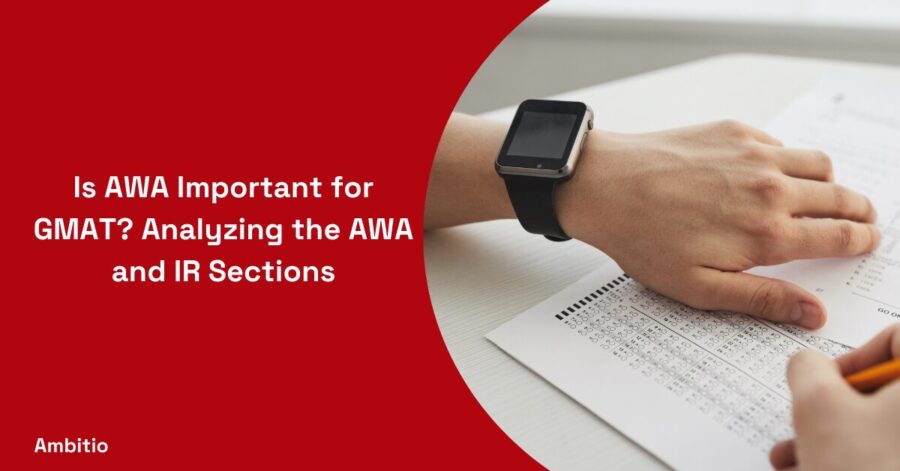14 December 2024
7 minutes read
Is AWA Important for GMAT? Analyzing the AWA and IR Sections

Introduction
When it comes to the GMAT (Graduate Management Admission Test), most test-takers primarily focus on the quantitative and verbal sections, which form the core of the exam.
However, there are two often-overlooked sections that are equally important: the Analytical Writing Assessment (AWA) and the Integrated Reasoning (IR) section. In this comprehensive article, we will delve deep into the significance of the AWA and IR sections in the GMAT, their impact on MBA admissions, and why these components matter for aspiring business professionals.
Understanding the AWA Section
The AWA Essay
The AWA section of the GMAT consists of one essay, and test-takers are given 30 minutes to complete it. This essay assesses your ability to analyze an argument and communicate your thoughts effectively in written English. The AWA score ranges from 0 to 6, with half-point increments.
Importance of AWA
The Analytical Writing Assessment (AWA) section of the GMAT often finds itself at the center of debates among test-takers regarding its importance. Some may wonder if spending time and effort on this section is worthwhile, given its relatively small contribution to the overall GMAT score. However, let’s delve deeper into why AWA matters and why you should take it seriously.
1. Reflection of Communication Skills
The AWA section is your chance to showcase your ability to communicate effectively in written English. This is a crucial skill, especially in the business world, where clear and concise communication is essential. Business professionals often need to write reports, emails, and memos, and the AWA section evaluates your proficiency in this aspect.
A well-structured and coherent essay not only earns you a higher AWA score but also demonstrates your capability to convey ideas persuasively, a skill highly valued in the corporate environment. Thus, AWA reflects your potential to excel in the MBA program and your future career.
2. Holistic Application Assessment
Many MBA programs emphasize holistic admissions, considering various aspects of an applicant’s profile. While quant and verbal scores provide a quantitative measure of cognitive abilities, the AWA score adds a qualitative dimension. Admissions committees look for candidates who are not only academically competent but also possess strong communication skills.
A high AWA score can be a differentiator. It tells the admissions committee that you not only excel in standardized tests but also have the capacity to articulate your thoughts persuasively and coherently. This can tip the balance in your favor, particularly if you are competing with other applicants with similar GMAT scores.
3. Evaluating Argumentative Skills
The AWA section is not just about writing; it’s about critical thinking and argumentation. Test-takers are required to evaluate an argument and provide a structured response. This skill is not only relevant for academic purposes but also for business decision-making.
In a professional setting, you may often need to assess arguments, make recommendations, or present persuasive proposals. A strong AWA performance suggests your ability to analyze complex issues, identify weaknesses in arguments, and offer constructive solutions—competencies that are highly sought-after in the business world.
4. Relevance in MBA Programs
Once you are admitted to an MBA program, the importance of effective written communication becomes even more apparent. MBA coursework involves extensive reading, research, and writing. Professors expect students to articulate their thoughts clearly, concisely, and persuasively in assignments, reports, and presentations.
A strong AWA score can serve as an indicator of your preparedness for the academic rigors of an MBA program. It assures both you and the admissions committee that you have the foundational writing skills necessary for success in your studies.
5. A Way to Compensate Weaknesses
For some applicants, their AWA score can be a way to compensate for weaknesses in other parts of their application. If you have a lower than desired GMAT quant or verbal score, a strong AWA score can demonstrate your overall competence. It can convey to admissions committees that you have a holistic skill set, which can be beneficial for your case.
Tips for Excelling in AWA
- Practice Writing Essays: Develop a structured approach to essay writing and practice analyzing arguments. Familiarize yourself with the AWA essay prompts to be better prepared on test day.
- Time Management: Manage your time effectively during the AWA section. Allocate sufficient time for brainstorming, writing, and revising your essay.
- Construct Clear Arguments: Focus on constructing clear and concise arguments. Use relevant evidence to support your points and avoid logical fallacies.
Insights into the IR Section
The IR Section
The Integrated Reasoning (IR) section of the GMAT evaluates your ability to interpret and analyze data presented in various formats, such as graphs, tables, and charts. This section consists of 12 questions, and you have 30 minutes to complete it.
Importance of IR
While the quant and verbal sections often take the limelight in GMAT discussions, it’s essential not to overlook the significance of the Integrated Reasoning (IR) section. IR, introduced to the GMAT in 2012, evaluates your ability to handle complex data, make informed decisions, and solve real-world problems. Here’s why the IR section matters and why it should be a priority for GMAT test-takers:
1. Reflects Real-World Problem-Solving Skills
In today’s data-driven business environment, the ability to analyze and interpret complex information is crucial. The IR section simulates real-world scenarios where you must assess data presented in various formats, such as charts, graphs, tables, and written content, and draw conclusions. This skill is highly relevant to the demands of the modern workplace.
Business professionals often encounter situations where they must make data-informed decisions, and the IR section gauges your readiness for these challenges. A strong performance here indicates your potential to excel in a business context.
2. Quantitative and Analytical Proficiency
The IR section tests both your quantitative and analytical abilities. You’ll encounter questions that require mathematical calculations, data interpretation, and logical reasoning. This comprehensive evaluation ensures that you possess the quantitative and analytical skills needed for success in a business school and, later, in your career.
Business programs emphasize quantitative coursework, and strong IR performance demonstrates your readiness to tackle these subjects. Moreover, analytical skills are highly transferable, benefiting you not only in academics but also in problem-solving situations across various industries.
3. Critical for Data-Driven Fields
If you’re interested in fields such as finance, consulting, marketing, or operations, where data analysis is paramount, a strong IR score can be a compelling asset. Employers in these sectors often seek candidates who can make sense of complex data and derive meaningful insights to drive business strategies.
A high IR score signals to both business schools and potential employers that you have the analytical prowess required to excel in data-centric roles. It can open doors to internships, job opportunities, and post-MBA career paths that align with your aspirations.
4. Demonstrates Adaptability
The IR section’s unique format, which includes multi-tabbed data sets and interactive tools, assesses your adaptability to different data presentation styles. Being able to navigate these tools and effectively analyze information is a skill that goes beyond the GMAT. It prepares you for handling diverse data sources and tools commonly used in business analysis.
Your ability to adapt to various data formats not only demonstrates your proficiency but also your resourcefulness in leveraging technology to make informed decisions—a valuable trait in today’s digital age.
5. Importance in MBA Curriculum
Once you enter an MBA program, the skills tested in the IR section become even more relevant. You’ll encounter coursework that involves data analysis, case studies, and strategic decision-making—all of which draw from the same skill set evaluated in the IR section.
Tips for Excelling in IR
- Data Interpretation Practice: Work on your data interpretation skills by practicing with real-world examples and diverse data formats. This will help you tackle IR questions more efficiently.
- Time Management: Manage your time effectively during the IR section. Allocate a specific amount of time for each question, and don’t get stuck on a single question.
- Use Available Resources: Utilize the tools provided in the IR section, such as the on-screen calculator and the ability to highlight text. These can be valuable aids for solving complex problems.
AWA and IR’s Impact on MBA Admissions
Holistic Admissions
Many MBA admissions committees look beyond just your total GMAT score. They focus on the individual components, including the AWA and IR scores, to gain a holistic view of your abilities. A strong AWA score showcases your ability to express ideas clearly, while a good IR score demonstrates your analytical prowess.
Differentiating Factor
A strong AWA and IR score can set you apart from other applicants with similar quant and verbal scores. Admissions committees appreciate applicants who excel not only in traditional academic areas but also in written communication and data analysis.
MBA Program Requirements
The importance of AWA and IR scores may vary from one MBA program to another. Some programs may place a higher emphasis on these scores, while others may consider them as additional data points. Therefore, it’s crucial to research the specific requirements of the MBA programs to which you intend to apply.
Tips for Acing the AWA and IR Sections
AWA Tips
- Practice Writing Essays: Develop a structured approach to essay writing and practice analyzing arguments. Familiarize yourself with the AWA essay prompts to be better prepared on test day.
- Time Management: Manage your time effectively during the AWA section. Allocate sufficient time for brainstorming, writing, and revising your essay.
- Construct Clear Arguments: Focus on constructing clear and concise arguments. Use relevant evidence to support your points and avoid logical fallacies.
IR Tips
- Data Interpretation Practice: Work on your data interpretation skills by practicing with real-world examples and diverse data formats. This will help you tackle IR questions more efficiently.
- Time Management: Manage your time effectively during the IR section. Allocate a specific amount of time for each question, and don’t get stuck on a single question.
- Use Available Resources: Utilize the tools provided in the IR section, such as the on-screen calculator and the ability to highlight text. These can be valuable aids for solving complex problems.
Conclusion
In conclusion, while the quant and verbal sections of the GMAT are undoubtedly important, it’s essential not to underestimate the significance of the AWA and IR sections. These scores can influence your chances of admission to MBA programs, so invest time in preparing for them and strive for excellence in all facets of the GMAT exam.
Your holistic performance can make your application stand out to admission committees, and in a competitive MBA admissions landscape, every point counts. So, embrace the AWA and IR sections as opportunities to showcase your unique skills and capabilities to prospective business schools.
Frequently Asked Questions (FAQs)
Q1: Are AWA and IR scores as important as the quant and verbal scores for MBA admissions?
While quant and verbal scores hold significant weight, AWA and IR scores provide insights into your written communication and analytical abilities, which are valued by MBA programs. So, yes, they are important.
Q2: What is a good AWA and IR score for MBA admissions?
A score of 5 or 6 in AWA and a score of 6 or 7 in IR are generally considered strong scores for MBA admissions.
Q3: Can a low AWA or IR score negatively impact my chances of admission?
Yes, a very low AWA or IR score may raise concerns about your written communication or analytical abilities. However, other aspects of your application, such as your work experience and recommendations, also play a crucial role.

You can study at top universities worldwide!
Get expert tips and tricks to get into top universities with a free expert session.
Book Your Free 30-Minute Session Now! Book a call now




























